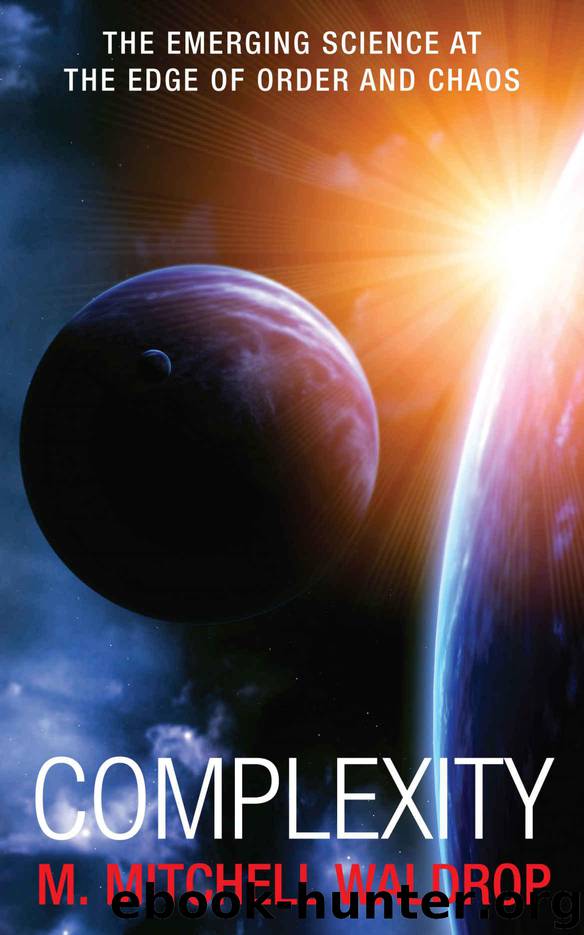Complexity: The Emerging Science at the Edge of Order and Chaos by Waldrop M. Mitchell

Author:Waldrop, M. Mitchell [Waldrop, M. Mitchell]
Language: eng
Format: azw3
Published: 2016-04-30T16:00:00+00:00
A Place to Come Home To
The kitchen-table conversation between Holland and Arthur wandered on and on for hours, as kitchen-table conversations are wont to do. By the time they finally called it a night, their discussion had gone from chess to economics, from economics to checkers, and then on to internal models, genetic algorithms, and chess again. Arthur felt he was finally beginning to understand the full implications of learning and adaptation. And the two of them had rather sleepily begun to bat around an approach that might just crack this problem of rational expectations in economics: instead of assuming that your economic agents are perfectly rational, why not just model a bunch of them with Holland-style classifier systems and let them learn from experience like real economic agents?
Why not indeed? Before he turned in, Holland made a note to dig out an old set of overhead transparencies on Samuel's checker player that he happened to have with him. Arthur had been enchanted with the idea of a game-playing program that learned; he'd never heard of such a thing. Holland thought he might give the meeting participants an impromptu talk on the subject the next day.
The talk was a hit—especially when Holland pointed out to his audience that Samuel's program was still pretty much the state of the art in checkers playing some thirty years later. But, then, Holland's whole approach had been a hit at the meeting. Nor were such impromptu interchanges at all unusual by that point. Participants find it hard to pinpoint exactly when the mood of the economics meeting began to change. But somewhere about the third day, after they had cleared away the early barriers of jargon and mutual confusion, the meeting began to catch fire.
"I found it very exciting," says Stuart Kauffman, who felt primed for economics after two weeks of talking to Arthur. "In a funny way it was like kindergarten, when you get exposed to all sorts of new things like finger painting. Or it was like being a puppy, running around sniffing at things, with this wonderful sense of discovery, that the whole world was this wondrous place to explore. Everything was new. And somehow that's what this meeting was like to me. Wondering how these other guys think. What are the criteria? What are the questions in this new field? That's very much my style, personally. But I think it had that flavor for a fair number of people. We went on talking at one another long enough to hear one another. "
Ironically, considering the physicists' early skepticism about mathematical abstractions, it was mathematics that provided the common language. "As I look back on it, I think Ken made the right decision," says Eugenia Singer, who had originally been disappointed at Arrow's failure to include sociologists and psychologists in the group. "He had the most highly, technically trained economists he could get. And as a result, there was a credibility that was built. The physical scientists were amazed at their technical background.
Download
This site does not store any files on its server. We only index and link to content provided by other sites. Please contact the content providers to delete copyright contents if any and email us, we'll remove relevant links or contents immediately.
Enlightenment Now: The Case for Reason, Science, Humanism, and Progress by Steven Pinker(7306)
A Journey Through Charms and Defence Against the Dark Arts (Harry Potter: A Journey Through…) by Pottermore Publishing(4798)
The Immortal Life of Henrietta Lacks by Rebecca Skloot(4575)
A Journey Through Divination and Astronomy by Publishing Pottermore(4379)
Elon Musk by Ashlee Vance(4121)
Origin Story: A Big History of Everything by David Christian(3687)
COSMOS by Carl Sagan(3617)
Alchemy and Alchemists by C. J. S. Thompson(3514)
Bad Pharma by Ben Goldacre(3422)
Enlightenment Now by Steven Pinker(3367)
Shadow of Night by Deborah Harkness(3358)
Inferior by Angela Saini(3311)
A Mind For Numbers: How to Excel at Math and Science (Even If You Flunked Algebra) by Barbara Oakley(3301)
Origin Story by David Christian(3194)
The Code Book by Simon Singh(3177)
Signature in the Cell: DNA and the Evidence for Intelligent Design by Stephen C. Meyer(3127)
The Elements by Theodore Gray(3050)
A Brief History of Time by Stephen Hawking(3022)
A Journey Through Potions and Herbology (A Journey Through…) by Pottermore Publishing(2848)
